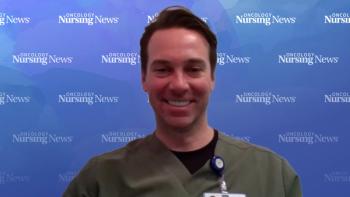
- October 2018
- Volume 12
- Issue 8
Difficult Conversations: Dealing with the Spiritual Needs of Patients with Cancer
How should oncology nurses deal with patients' spiritual needs?
Melissa Mills, BSN, RN, CCM, MHA
A cancer diagnosis can leave your patient with many questions. Sitting in a hospital room or infusion center for long hours might give them time to reflect on their diagnosis, life, and place in the universe. They may turn to you for support and answers as they meditate on their mortality. Is there a place for spiritual care in oncology nursing?
Oncology Nursing News® posed this question to the Reverend
In her current role, Baldwin brings her passions for nursing and as a spiritual counselor together to help patients and nurses. She describes spirituality as an integral part of any holistic nursing assessment, making it an essential component of active treatment and survivorship.
But for many nurses, engaging in these conversations can be uncomfortable. You may even question if this is indeed a part of your role. In a recent interview, Baldwin explained the difference between spirituality and religion and a few easy ways to handle these difficult conversations.
SPIRITUALITY VERSUS RELIGION IN NURSING CARE
There is no agreed-upon definition of spiritual care in nursing.1 Spirituality is personal and varies from one person to the next.
The
Baldwin simplifies this definition. In her view, “spirituality is a personal interpretation of the soul.”
How does this differ from religion? Baldwin described religion as a community of faith. It is structured and often defined by rituals. The online Merriam-Webster Dictionary defines religion as the service and worship of God or the supernatural.3 It is a personal set or institutional system of religious attitudes, beliefs, and practices.3
Religion and spirituality can occur together or separately, so it’s essential you first understand both. Then you can begin to practice a few ways to bridge these conversations easily or know when it is time to request help from a spiritual counselor.
KNOW YOUR SPIRITUAL BELIEFS
Baldwin stressed the importance of knowing and understanding your own beliefs before engaging in conversations with your patients. One study that examined how nurses assist patients with spirituality found that the personality and background of the nurses influence how they approach these conversations.1
Your comfort level with your spirituality is connected to how you view patients in illness.1 Your comfort zone should include your spiritual and religious beliefs, practices, and limitations. If prayer is outside of your comfort level, that’s okay, Baldwin says. You can still offer spiritual care to your patients by being present.
MEET PATIENTS WHERE THEY ARE
Nurses aren’t expected to know all the answers. You often don’t need any answers to meet the patient where they are on their spiritual journey.
Active listening is one of the best skills to use when dealing with difficult conversations. Listen to understand, not to respond. Acknowledge your patient’s courage in talking about their spiritual needs and thoughts. Baldwin also suggested using a technique like reflection, where you merely state back to the patient what they just said, to keep the conversation going. “Be open to [patients’] beliefs and allow them to talk freely,” Baldwin says. “A quiet moment of silence or simple prayer may be all that’s needed.”
When engaging in conversations around spirituality, be careful not to overstep the bounds of your professional responsibility. Always speak with compassion and honesty.
If the conversation goes in a direction outside of your abilities or inclinations, it is okay to let the patient know that you would like to call in a spiritual counselor to be sure that their needs are met.
KNOW WHEN TO TURN TO A SPIRITUAL COUNSELOR
“Even pastors need to lean on others for help,” said Baldwin. She described fellow spiritual leaders as a necessity. Keep a list of religious leaders in your area and call on them for spiritual needs outside of your comfort zone and abilities. If your health system has a chaplain, use their services. And you can always ask the patient if they have a pastor, rabbi, or another spiritual counselor they would like you to call.
To increase your spiritual literacy, read books and journal articles. Understand different religions and spiritual beliefs. Talk about spiritual care practices in in-services or nurse meetings. Have a chaplain present on common topics.
PRACTICE SPIRITUAL SELF-CARE
Nurses deal with life-or-death situations. Your soul connects with others. This makes self-care imperative. “Acknowledge your own beliefs and sadness,” says Baldwin. “Make your physical, emotional, and spiritual health a priority. Nurses are at a high risk for compassion fatigue, which can lead to depression, anxiety, and exhaustion. You must care for your own spiritual needs to be able to provide needed spiritual care to others.”
FROM THEORY TO BEDSIDE
Offering spiritual care doesn’t have to be difficult. Prayers can be simple and words don’t have to be fancy. Be present and connect to the spiritual needs of your patients and care for yourself, too. And if you don’t feel comfortable in the role, call in an expert.
Melissa Mills, BSN, RN, CCM, MHA is a freelance healthcare writer and the owner of MakingSpace.company. She has been a registered nurse for 20 years and is passionate about case management, nursing leadership, and finding the right care for patients in every setting.
REFERENCES
- Giske T, Cone P. Discerning the healing path — how nurses assist patient spirituality in diverse health care settings. J Clin Nurs. 2015;24(19-20):2926-2935. doi: 10.1111/jocn.12907.
- Hughes Rev BP, DeGregory C, Elk R, Graham D, Hall Rev EJ, Ressallat J. Spiritual care and nursing: a nurse’s contribution and practice. HealthCare Chaplaincy Network website. healthcarechaplaincy.org/docs/about/nurses_spiritual_care_white_paper_3_3_2017.pdf. Published March 2017. Accessed September 6, 2018.
- Religion. Merriam-Webster Dictionary website. merriam-webster.com/dictionary/religion. Accessed September 6, 2018.
Articles in this issue
about 7 years ago
Rebuilding the Breastabout 7 years ago
Understanding Multigene Testing for Breast Cancerabout 7 years ago
MDM2 Inhibitor May Improve Response in Acute Myeloid Leukemiaabout 7 years ago
Bypassing the SICU May Improve Patient Outcomesabout 7 years ago
Ketamine May Benefit Those With Difficult Pain From Ovarian Cancerabout 7 years ago
Dressing for the Seasonabout 7 years ago
Recognize and Report Itabout 7 years ago
Camping for Healthabout 7 years ago
Nursing Through the Prism of ChildhoodNewsletter
Knowledge is power. Don’t miss the most recent breakthroughs in cancer care.

















































































